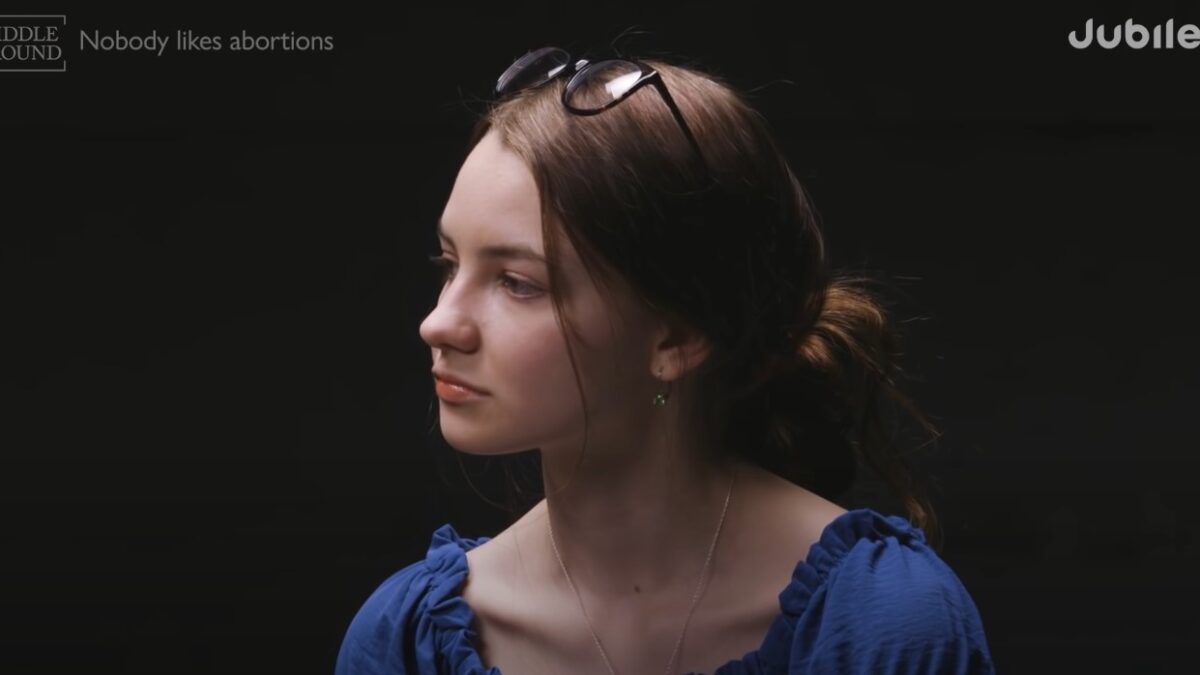Pro-abortion activists present the practice as a consequence-free solution for rape, but they fail to consider the humanity of both the pre-born child and the woman experiencing the trauma of rape. It’s as if they think ending the life of the unborn child will heal the victim’s pain.
Women who find themselves in situations like this but choose to continue opposing abortion are, ironically, frequently accused of being heartless and cruel. In degrading confrontations, they are told the lives of their pre-born children do not matter.
This is what happened to a young woman named Ayala outside the Supreme Court the day before it issued its decision in Dobbs v. Jackson Women’s Health Organization, effectively overturning Roe v. Wade.
For Ayala, being confronted like this was very personal. As a child, she became pregnant after she was raped by a family member. She did not seek an abortion.
Ayala said that after she shared this information with the person confronting her, she was called “disgusting” for not aborting her child.
Ayala’s Story
Ayala, 19, goes by her Hebrew name in advocating for women and the unborn on her Twitter, Instagram, and TikTok. She also serves as a state captain for Students for Life and is part of the liberal pro-life organization PAAU. She was not always an anti-abortion activist, but this changed when Ayala was raped at age 11.
“It was in the summer of my fifth-grade year,” she told me. “I started being sexually abused. Progressively, it got more and more intense to the point where I was being raped pretty often. I was raped more times than I could count.”
Ayala’s abuser was a relative staying with her family, significantly worsening things. She said she was “a shell of a person” throughout the ordeal.
“I didn’t get to have a normal upbringing and childhood,” she lamented. “Because of that, it completely changed how I interacted with other people. My life was centered around my abuse.”
At 15, she became pregnant. And she dreaded the idea of having a child.
“I had this man who was willing to hurt me very terribly. What would he be willing to do to my unborn child and me if he found out I was pregnant? I was worried that he would kill me.”
As her pregnancy progressed, keeping her baby became more appealing to her. She said, “I started noticing mothers with their children. I started noticing pregnant women. I started noticing the beauty of motherhood.” After reading material from a local pregnancy care center, she began to think to herself, “Maybe I could do this? Maybe it’s going to be OK; maybe I can tell someone what happened?”
Tragically, her optimism was short-lived as she experienced a miscarriage during a math exam while in school. She said, “I went to the bathroom and had this overwhelming feeling of dread. I was crying. I had never felt that much panic in a single moment before.” Despite the pain and panic she was experiencing, a school employee dismissed her, telling her she was having a bad period.
Not long after this experience, Ayala met her boyfriend, and he urged her to tell the police about her relative’s abuse. After doing so, she was assigned a social worker who scheduled an interview with her abuser. He confessed to his misdeeds, but the district attorney dropped the case in a bizarre turn of events.
“Everyone was confused as to why,” she said sorrowfully, “but that was the outcome of my case. And it is the outcome for many girls just like me.”
Coming out about the abuse she suffered came at a cost. While her boyfriend and best friend at the time were supportive, Ayala’s family was not. She said, “My family was very angry with me for reporting because they felt like I could have easily not said anything — he was about to move out.”
Once the abuser exited her life, Ayala attained a newfound freedom for which she is incredibly grateful. But she also credits her unborn baby, who she named Rachel, “for inspiring and helping me think, you know, maybe this rape isn’t the rest of my life.”
‘Children Like Mine Don’t Deserve to Be Erased’
Ayala believes her story is important.
“I have the exact experience that many people will use to justify abortion, which is, you know, an underage girl who got pregnant from rape, who is in an unsafe living situation,” she said.
She says her story has empowered women with similar experiences, some of whom “have reached out and thanked me for my voice when I speak out about how [abortion advocates] don’t speak for all rape survivors, they don’t speak for the women who get pregnant from rape and love our children.”
“Our children,” she believes, “are not responsible for the crimes of their fathers and are completely innocent, unique human beings from the moment of conception. They’re deserving of the right to life just like anyone else.”
“I just want to be able to tell people that I loved my baby,” she said. “I mourn her loss every day of my life. Children like mine don’t deserve to be erased because of the way they were conceived or because they seem inconvenient to the rest of society.”
‘Innocence’
Ayala’s advocacy has undoubtedly been shaped and informed by her experiences. If there is anything that captures the essence of her story, however, it would be the name of the child she lost.
In Hebrew, Rachel means “female sheep.” It also means “innocence.” Gifting her child this name was an intentional act of affirmation.
“Rachel, my innocent light,” Ayala said, “is worthy of a name testifying to how she was perfect, holy, and blameless.”
She will never be forgotten.









